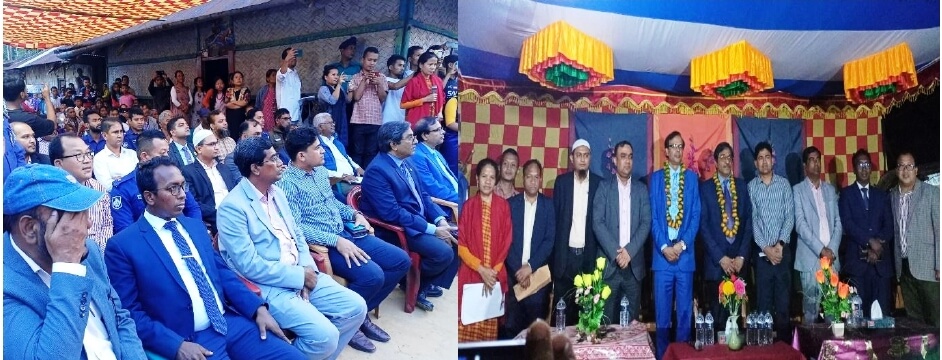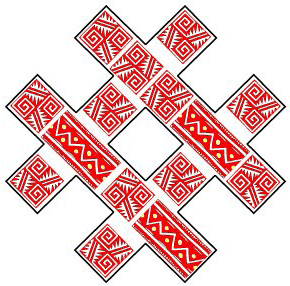National Human Rights Commission Chairman visited to Jhimai Khasi Punji to investigate their problems & sufferings

On February 27, 2024, the Hon’ble Chairman of the National Human Rights Commission Dr. Kamal Uddin Ahmed and Hon’ble Full-Time Member Md. Salim Reza visited Jhimai Punji of Khasis under Kulaura Upazila of Moulvibazar District. In this visit, Honourable Chairman and Honourable Full-Time Member were accompanied by Commission Director (Administration and Finance) Kazi Arfan Ashiq, Deputy Director Mohammad Gazi Salauddin, Assistant Director Md. Tanbirul Islam. Along with Moulvibazar District Administration, Police Administration, Local Administration Representative Divisional Forest Officer Mr. Humayun Kabir, Kulaura Upazila Nirbahi Officer Mr. Mahmudur Rahman Mamun, Assistant Commissioner (Land) Mr. Mehdi Hasan, Officer in Charge (Investigation), Kulaura Thana Mr. Kashainya Marma, Kapaeeng Foundation Program Manager Mr. Uzzal Azim and Manager of Jhimai Tea Garden Mr. Moniruzzaman, Adivashi Chatra Songram Parishad President Mr. Alik Mree and others were present. Punji residents welcomed the guests from the gate with flowers and hosted the guests at the punji Mantri’s/headman’s house.
On the occasion of Jhimai Khasi Punji visit of Hon’ble Chairman and Honourable Full-Time Member of the National Human Rights Commission, Khasi peoples of Punji organized a Discussion Meeting. At the beginning of the ceremony, the guests were honoured with the product made of betel leaf and nut produced by the Khasis. Khasi youth artists performed the traditional dance of Khasi in honour of the guests. After that, Ms. Flora Babli Talang, General Secretary of KUBORAJ Inter-Punji Development Organization and Executive Member of Kapaeeng Foundation delivered a welcome speech. In her speech she said, “I thank you on behalf of the people of Punji for visiting our Punji today. We hope, seeing our situation on the ground, you will consider us from a human point of view and take measures to end all our sufferings.”
Mr. Rana Surong, Mantri/Headman of the Jhimai Punji delivered main speech on behalf of Punji people and covered all the issues, problems and sufferings of Punji peoples. Mr. Rana said, “We, more than four hundred people of 72 Khasia families, have been making a living by farming panjum along with house settlements on our customary and ancestral lands for ages. Our land has the sacred burial ground or graveyard of our ancestors, three religious churches, playground, youth sports club, cultural centre, Khasi mother language education centre, a primary school where 71 children running their study. Our Punji is surrounded by our Panjum land and thousands of trees. We save and care for these trees on our own initiative. Trees are Gods to us. Everyone would agree that the Khasi community in Greater Sylhet is playing a leading role in protecting forests, biodiversity, and environment. But for a long time, a group of profiteers and crooks have been conspiring to evict the Khasis from their lands and deforest by cutting trees. Land grabbers are misleading people by providing various false and fabricated information in the name of Khasis. The only aim of all these is to evict the Khasis from the land. We appeal to you to protect our traditional land so that no one can oppress us.”
Father Joseph Gomez, OMI, a longtime friend of the Khasi community and human rights activist, spoke on the overall human rights situation of the Khasis mentioning that in 2008, Jhimai Tea Garden got permission to cut 2096 trees from the Forest Department. Since then, the Khasi community, environmentalists and various human rights organizations have been protesting against it and till now the tea plantation authorities have not been able to cut the trees. In 2015, the Punji headman filed a writ petition on the advice of various civil society members.
Salim Reza, a full-time member of the National Human Rights Commission, said in his speech, “We are here today to visit this capital on the ground and to identify the problems.” He also said that the issue is very complicated, but it is also important to address it.
Then Mr. Riaz Uddin, Range Officer spoke on behalf of the Forest Department. He said there is no ownership or any other dispute of forest department land with Khasia Punji. The area of Khasi Punji living there is leased as Khas lands and tea plantations. The tree felling dispute is between the Khasi Punji and the Tea Estate Authority, not the Forest Department. The Forest Department has not yet given permission to cut 2096 trees. The Forest Department has only listed the trees. There is a revenue permit process which is obtained by applying from the Tea Estate Authority through the district administration and obtaining the certification of the tea board. After that, clearance is taken from the Departmental Environment Office. Then the forest department listed it, the forest department made that list only 2096. Then it was a case in the Court and then there was an appeal. In view of the observations made by Hon’ble Appellate Division, we have relisted in 2022 after 2019. Since the Appellate Division has said that natural trees cannot be cut, the Forest Department re-enumerated 1987 trees, excluding 110 from 2096 trees. Excluding the important naturally occurring extinct plants, the remaining list of trees are kept to be cut down. The next step is to get approval from the Environment and Forest Development Committee. A sub-committee has been made from the District Environment and Forest Development Committee. The sub-committee has inspected the field level whether the instructions and observations of the Appellate Division have been implemented by the tea garden authorities but has not yet given a report.
Mr. Moniruzzaman, the manager of Jhimai Tea Estate, said that Jhimai Tea Estate had 661.5 acres of land from 1972 to 1992 for the first lease for twenty years. The second lease was from 1992 to 2012. The third lease was leased for forty years from 2012 to 2052. The lessee can expand the tea garden by two and a half per year under this condition. Jhimai Tea Garden has been expanding the garden every year but has not been able to expand since 2010. Then applied to forest department and tea board as per government rules to cut down many i.e. 2096 trees to expand our areas. In 2019, Rana Surong filed a writ petition in His Majesty’s Court. The final hearing of this writ petition was held on 30 March 2017 and the judgment was in our favour. Later, Rana Surong filed an appeal in the Appellate Division of the Supreme Court challenging the judgment of the High Court. After the final hearing of the appeal, the appeal was dismissed. The judgment of the High Court is upheld. The court gave us some conditions.
Hon’ble Chairman of the National Human Rights Commission, Dr. Kamal Uddin Ahmed said in his speech, indigenous peoples have customary rights. The Father of the Nation made the country independent to realize the rights of the people of this country. Indigenous people too contributed to the great War of Liberation. Indigenous peoples will not survive unless their culture survives. They cannot be evicted from the places where they have been living for a long time. Dr. Kamal Uddin said, indigenous people have been living closely with harmony and sincerity between them in the Punji area of Kulaura. He questioned why the place where a community has been living for a long time is being leased again and again. There is a problem with cutting trees here. The livelihood of the people depends on the trees that are being targeted to cut down. Both survival and livelihood are their right. If livelihood is destroyed, there will be no life. He further said, “Three complaints have already been filed in our commission. We are here to understand them deeply. As for the purpose of local administration and garden authorities, we have to act more conservatively; So that the livelihood of a group is not wasted”.
Finally, Mr. Pratyush Asakra, President of KUBORAJ Inter-Punji Development Organization, thanked the Hon’ble Chairman of the National Human Rights Commission and the Full-Time Member and other guests for coming to Khasi Punji and listening to their grievances and concluded the program by wishing everyone good health and long life.

